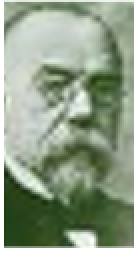Travel Reference
In-Depth Information
Robert
Koch
Like few other
physicians of
his day, Robert
Koch (1843-
1910) laid the
foundations and
shaped the face
of modern medi-
cine with his
pioneering dis-
coveries. The Director of the
Institute for Infectious Diseases,
Koch also taught and researched
at the Charité Hospital. In 1905
he received the Nobel Prize for
Medicine for his discoveries in
the field of microbiology.
burdened with large numbers of
children, and of social outcasts.
Her
Pieta
now adorns the Neue
Wache
(see p13)
.
Jacob and Wilhelm Grimm
The brothers Jacob (1785-
1863) and Wilhelm (1786-1859)
Grimm are well known around
the world, thanks to their collec-
tion of classic fairy tales includ-
ing
Little Red Riding Hood
and
Hansel and Gretel
. Equally
important, however, was their
linguistic output, the
German
Grammar
and
German Dictionary
which are standard reference
works even today.
Robert Koch
Georg Wilhelm Hegel
The influential philosopher
Hegel (1770-1831) taught at
Humboldt University from
1818 until his death.
Theodor Fontane
A Huguenot, Fontane
(1819-98) was one of the
most important 19th-centu-
ry novelists in Germany.
He also worked as a jour-
nalist for more than 20
years, penning many of
his articles and essays
in the Café Josty on
Potsdamer Platz.
Fontane is particularly
well known for his
Walks in the Province
of Brandenburg
, in which he
describes the mentality of the
people, historic places and the
Brandenburg landscapes.
Felix Mendelssohn
Bartholdy
The composer (1809-
47), a grandson of
Moses Mendelssohn,
was also the conductor
of the Staatskapelle (state
orchestra) at the opera
house in Unter den Lin-
den. His grave is found in one of
the cemeteries in front of the
Hallesches Tor in Kreuzberg.
Sculpture by Kollwitz
Käthe Kollwitz
The sculptor and painter
Käthe Kollwitz (1867-1945) por-
trayed the social problems of the
poor, and her work provides a
powerful, haunting commentary
on human suffering. Kollwitz
spent a large part of her life in a
modest abode in the square that
is now named after her, in the
Prenzlauer Berg district. A monu-
ment recalls how she captured
the lives of poor Berlin families,
Felix Mendelssohn Bartholdy
For moments in history in Berlin
see pp
42-3
51













